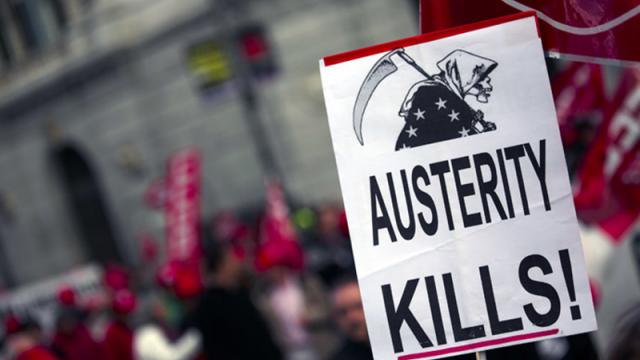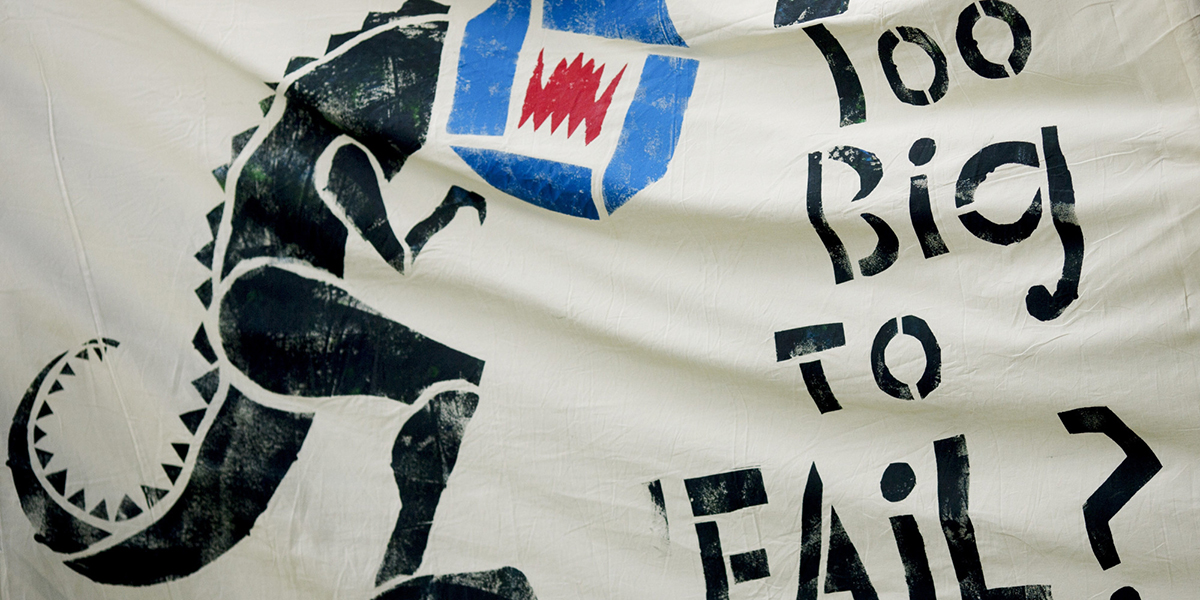
The 2008 financial crisis left political and economic elites with two major problems: how to pay for the bank bailouts in the short term and how to prepare for the next financial collapse. The solution put forward for the first problem was to spread the pain downward, insulating the people who created the mess from the consequences of their chronic gambling. In second case, they looked to a policy of last resort that had only been used once before, during the Great Depression.
Of course, they had to create catchy, near incomprehensible terms for these policies in order to make an increasingly stressed out, debt-ridden population accept them as the new normal. Thus, they gave us austerity and later, the bail-in.
Austerity: So What Else is New?
Austerity used to be one of those words that made an impression on me when I heard it. It brought to mind sensible, beer-drinking Bavarian monks. Now I’m fed up with seeing it in the news, always being sold as some kind of economic “tough love.”
The thing is, austerity has been around in poorer countries for years, imposed from on high by the IMF and the World Bank. During the 1980s and 90s it was called “debt restructuring.” All the available evidence shows it was an unmitigated disaster for working people in countries from Argentina to Zaire.
Still, failure rarely stops economists with a theory. So austerity got introduced after the crash of 2008 into the post-industrial economies of the West, especially in the European Union.
But what does austerity actually mean? According to Investopedia, “austerity measures generally refer to the measures taken by governments to reduce expenditures in an attempt to shrink their growing budget deficits.” In practice, it has meant cuts to social services and reductions in government workforce.
Ireland, once called the Celtic Tiger and promoted as an economic success story, became a poster child for these programs after 2008. The country made no move to increase its corporate tax rate, a logical step considering, at 12.5%, it had one of the lowest in Europe. Instead, the Irish government targeted cuts at its most vulnerable citizens.
In the first austerity budget, legislators lowered the minimum wage, cut 3 billion Euros from the welfare rolls and eliminated 25,000 government jobs. One sad result of this has been a mass exodus from the country, especially among the young, something not seen since the early 20th century.
The austerity story was much the same in Greece, Italy, Spain and Portugal, the countries hardest hit by these programs. In North America, the term isn’t used as much to describe belt-tightening policies, in part because aspects of austerity programs are seen as business as usual, even in good times. This is especially true in the U.S. where one party campaigns on shrinking government and privatizing everything, while the other party pretends to do otherwise but quietly enables those cuts and privatizations in order to pay back the corporate interests that fund its campaigns.
Austerity has already led to protests around the world, and it’s hard to see how these policies could be extended to another crisis without massive civil unrest. Looking at the bubbles that have ballooned since 2008 in the bond and derivatives markets, the next bust is practically inevitable. At the same time, further bailouts seem politically untenable, which leads us to the next big heist in the name of protecting the global casino: the bail-in.
Saving is for Chumps
It used to be that savers were considered the backbone of any advanced economy. Whether buying a home or paying for a child’s education, it was taken for granted that one had to save for it. Nowadays, savers go by another name: suckers. This is in part because of the macro-economic policy called Quantitative Easing, or QE, in which money is printed at a rapid clip by central banks in order to keep interest rates artificially low. But its also going to be due to a thing that less people are talking about: the bail-in.
One Tuesday morning in late March 2013, depositors in insolvent banks in Cyprus awoke to find that their bank accounts had been given a “haircut,” with accounts under 100,000 euros reduced by 6.75% while those over 100,000 lost 9.9%. At the time, it was made to seem like a unique situation and much was made of the fact that Russian oligarchs were using Cyprus as a tax haven. As if this made it okay to steal depositor’s money.
Before looking at this specific example, we should note that commercial banks have junior and senior creditors. Traditionally, senior creditors (depositors and some classes of bond holders) are supposed to receive their money before junior creditors (shareholders and those holding riskier, higher yield bonds) in the event of an institutional collapse.
In the case of Cyprus, the order of payment between senior and junior creditors was reversed. As reported at the time by Forbes magazine, hardly a bastion of left-wing orthodoxy: “In the end it amounts to the cronies (other banks and government) and non-cronies. The cronies get 100% (of their money) or more; the non-cronies, including non-interest-bearing depositors who should be super-senior, get a kick in the gut instead." Thus, Cypriot depositors paid the lion’s share of the cost of rescuing their over-leveraged banks in tandem with facing the kinds of austerity measures seen elsewhere.
On the Road to Serfdom, Again
In a story featured on Occupy.com a few weeks ago, Ellen Brown reported that during the mid-November G20 summit in Brisbane, leaders of most the world’s biggest economies passed the “Adequacy of Loss-Absorbing Capacity of Global Systemically Important Banks in Resolution.” Besides being more than a mouthful of seemingly unrelated words, this document enshrines bail-ins for these countries with a unique twist: they will not only go after depositor’s money but also pension fund investors (major holders of now “bail-inable bonds") in the event of the collapse of another Too Big to Fail institution.
You could be forgiven for thinking your money might be safer in a credit union or, considering that interest rates are near 0% anyway, under your mattress. It probably is. If anything has been proven since the collapse of 2008, it’s that the banksters are seen as far too important to the financial system to be made to pay for their crimes, leaving the 99% to foot the bill.
3 WAYS TO SHOW YOUR SUPPORT
- Log in to post comments


















